In keeping with the theme of Heritage Day, which we have just celebrated, we thought we would bring you a little bit of history of our indigenous African dogs.
We cannot feature them all, so here are just a few, along with snippets of their origins.
Africanis
(Source: www.africanis.co.za)
 Africanis is the name of all dogs native to Southern Africa. The name derives from Africa, the continent and Canis, meaning dog. The history of the Africanis dates back 7000 years, when dogs were brought into Africa by the Neolithic tribesmen. Dogs were domesticated along the Nile river before the Egyptian dynasties sprang up, and made their way via migration and trade into the Sahara. The Bantu brought their own domestic dogs with them in 200 CE (common era), when they left the Cameroon grasslands and eventually settled in Southern Africa.
Africanis is the name of all dogs native to Southern Africa. The name derives from Africa, the continent and Canis, meaning dog. The history of the Africanis dates back 7000 years, when dogs were brought into Africa by the Neolithic tribesmen. Dogs were domesticated along the Nile river before the Egyptian dynasties sprang up, and made their way via migration and trade into the Sahara. The Bantu brought their own domestic dogs with them in 200 CE (common era), when they left the Cameroon grasslands and eventually settled in Southern Africa.
Basenji
(Source: www.basenji.de/ Image source: www.justdogbreeds.com)
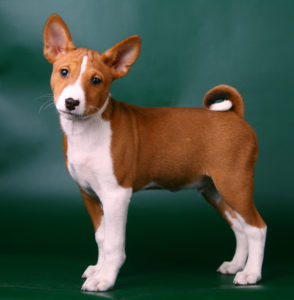 The Basenji originated in central Africa, and are amongst the oldest dogs in the world. “Basenji”, means “small wild thing from the bush”. The words sound like “Basenji” in the language of the Pygmies. The dogs lived as an independent pack close to the Pygmy natives’ villages. Their reproduction took place for thousands of years without human control. They are regarded as part of the family of “Schensi Dogs” which describe dogs that have remained wild and undomesticated. Other members of this family include the Canaan dog, from Israel and the Australian Dingo. One characteristic of the Basenji is that it cannot bark because of it’s flat larynx.
The Basenji originated in central Africa, and are amongst the oldest dogs in the world. “Basenji”, means “small wild thing from the bush”. The words sound like “Basenji” in the language of the Pygmies. The dogs lived as an independent pack close to the Pygmy natives’ villages. Their reproduction took place for thousands of years without human control. They are regarded as part of the family of “Schensi Dogs” which describe dogs that have remained wild and undomesticated. Other members of this family include the Canaan dog, from Israel and the Australian Dingo. One characteristic of the Basenji is that it cannot bark because of it’s flat larynx.
Canaan Dog
(Source: http://cdca.org)
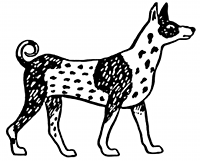 The Pariah dog, the middle eastern feral forefathers of the Canaan dog, dates back to pre-biblical times, where they originated in the “Land of Canaan”. The Pariah dog was a guard and herd dog of the ancient Israelites, looking after their camps and their flocks. Drawings have been found on tombs dating back 2200 to 2000 BC depicting dogs that bear a remarkable resemblance to today’s Canaan dog.
The Pariah dog, the middle eastern feral forefathers of the Canaan dog, dates back to pre-biblical times, where they originated in the “Land of Canaan”. The Pariah dog was a guard and herd dog of the ancient Israelites, looking after their camps and their flocks. Drawings have been found on tombs dating back 2200 to 2000 BC depicting dogs that bear a remarkable resemblance to today’s Canaan dog.
Rhodesian Ridgeback
(Source: www.rhodesianridgeback.org)
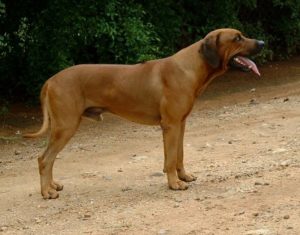 The arrival of the Europeans at the Cape in 1652 saw the introduction of a number of dogs, most of whom did not easily cope with the climate and local diseases. Nevertheless, these dogs were interbred with the indigenous hunting dogs, and thus the foundation was laid for South Africa’s contribution to the Rhodesian Ridgeback. There is written record of the resulting “ridged dogs” found in the Cape in 1729.
The arrival of the Europeans at the Cape in 1652 saw the introduction of a number of dogs, most of whom did not easily cope with the climate and local diseases. Nevertheless, these dogs were interbred with the indigenous hunting dogs, and thus the foundation was laid for South Africa’s contribution to the Rhodesian Ridgeback. There is written record of the resulting “ridged dogs” found in the Cape in 1729.
Pharaoh Hound
(Source: www.dogbreedinfo.com)
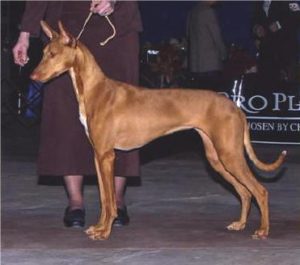 One of the oldest domesticated dog breeds in the world is the Pharaoh Hound, which is estimated to have origins dating back to 4000 to 3000 BC. Although the exact origin is unknown, the general belief is that they hailed from ancient Egypt. Many artifacts and writings depict a dog that is clearly a direct ancestor of the Pharaoh Hound. These dogs used to chase and hunt small game, and were loyal companions of the royal pharaohs. The dogs were eventually taken by the Phoenicians from Egypt to the Mediterranean Island of Malta, where in 1974 they were declared the national dog.
One of the oldest domesticated dog breeds in the world is the Pharaoh Hound, which is estimated to have origins dating back to 4000 to 3000 BC. Although the exact origin is unknown, the general belief is that they hailed from ancient Egypt. Many artifacts and writings depict a dog that is clearly a direct ancestor of the Pharaoh Hound. These dogs used to chase and hunt small game, and were loyal companions of the royal pharaohs. The dogs were eventually taken by the Phoenicians from Egypt to the Mediterranean Island of Malta, where in 1974 they were declared the national dog.
Boerboel
(Source: www.african-boerboel.co.za)
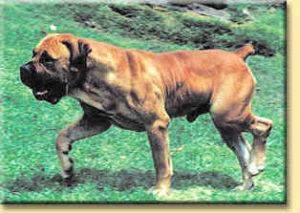 When Jan van Riebeeck was sent to establish a trading post at the southern tip of Africa, he brought along with him, for protection, a “Bullenbijter” (bull baiting dog), while other colonists brought their own large mastiff-type dogs with them. On the African heritage side, the Boerboel’s story starts in southern Ethiopia where the Cynomones tribe had dogs they referred to as “Indian Dogs”. These dogs apparently originated in Babylon and were described as strong, large and able to fight with lions. (Folklore suggests that these brave creatures were actually a cross between a dog and a tiger!). Thus, in the dog sense, Africa and Europe would meet when the large European dogs were bred with the strong African bloodlines. The resulting dogs from this cross-breeding then accompanied the Boers on their Great Trek into the northern parts of South Africa. The breed was developed from 1652 until 1900 by tough farmers who faced challenges from dangerous predators, tough climatic conditions and rough terrain. They had a need for a virile, brave and powerful dog, which they continued to breed until reaching the desired result, ultimately giving us the Boerboel.
When Jan van Riebeeck was sent to establish a trading post at the southern tip of Africa, he brought along with him, for protection, a “Bullenbijter” (bull baiting dog), while other colonists brought their own large mastiff-type dogs with them. On the African heritage side, the Boerboel’s story starts in southern Ethiopia where the Cynomones tribe had dogs they referred to as “Indian Dogs”. These dogs apparently originated in Babylon and were described as strong, large and able to fight with lions. (Folklore suggests that these brave creatures were actually a cross between a dog and a tiger!). Thus, in the dog sense, Africa and Europe would meet when the large European dogs were bred with the strong African bloodlines. The resulting dogs from this cross-breeding then accompanied the Boers on their Great Trek into the northern parts of South Africa. The breed was developed from 1652 until 1900 by tough farmers who faced challenges from dangerous predators, tough climatic conditions and rough terrain. They had a need for a virile, brave and powerful dog, which they continued to breed until reaching the desired result, ultimately giving us the Boerboel.
